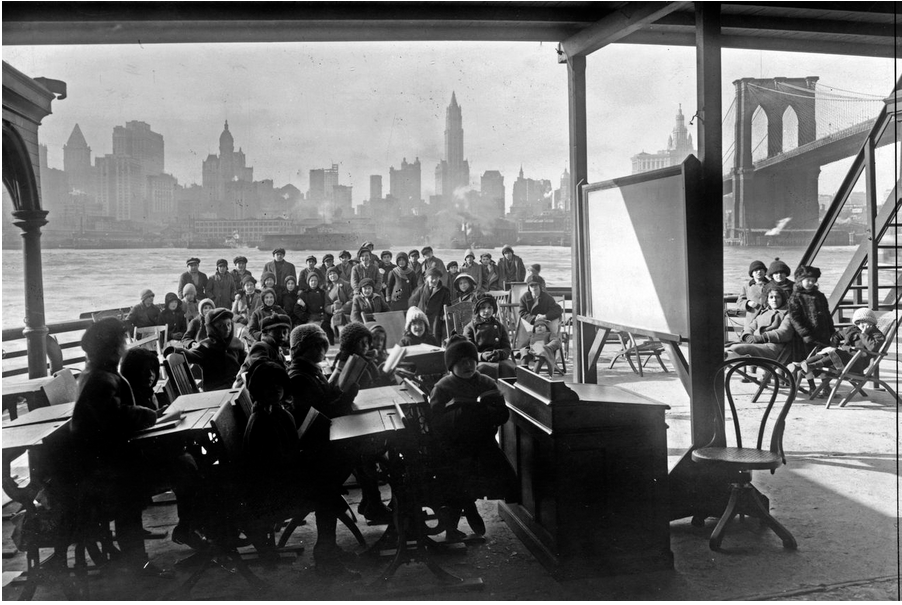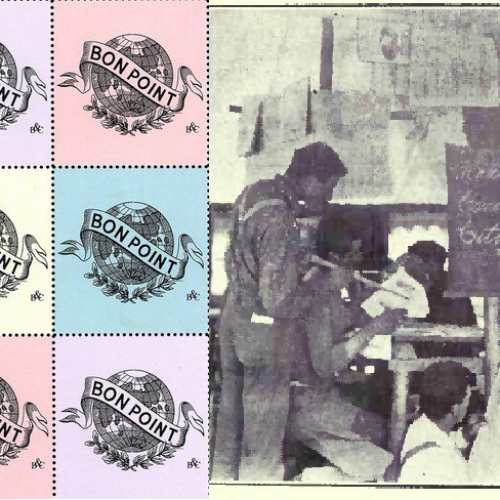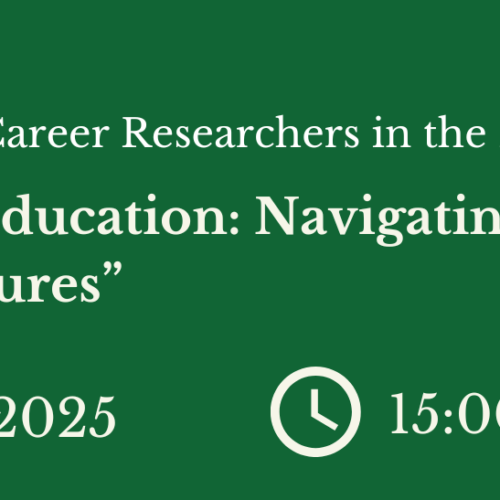Call for Contributions: Histories of the Present and Histories of the Past: Pandemics and Historians of Education
‘Paedagogica Historica’ is preparing a special issue on Pandemics and History of Education – abstracts welcome. Guest editors: Ian Grosvenor and Karin Priem. Managing editor PH: Inés Dussel.

An Open Air Class on Day Camp Rutherford, New York (Manhattan Island) across river, 1911. © Library of Congress.
2020 has been a year of global crisis, a crisis which is continuing. As of December 2020, there have been over 1.6 million deaths and over 70 million confirmed Coronavirus cases. COVID-19 has precipitated a global economic downturn which threatens the livelihoods of millions and has shined a harsh light on existing inequalities in society (Campbell 2020; UNESCO 2020). Faced with this global crisis some historians have looked to previous influenza pandemics to understand the nature of the disease and its trajectory and how previous generations dealt with similar health crises. In this context, it is the Spanish Influenza pandemic of 1918–1920 which has become the global crisis against which COVID-19 is measured. It is estimated the pandemic affected 20 to 40 percent of the world population and over 50 million people died. The Spanish flu had been forgotten but in recent years it was rediscovered by public health specialists following the “avian flu” epidemics in 2005 and 2009 and it has become an “omnipresent reference in the pandemic preparedness scenarios that have guided global health security in the last two decades” (Lachenal and Thomas 2020). However, this desire to learn from the past has been criticised by Guillaume Lachenal and Gaëtan Thomas who have argued against an over-reliance on the allure of “pandemic precedents” and instead advocate “an enhanced understanding of the capacity of present crises to resist historical interpretation.” They write that the current situation deserves something other than “a scholarly ‘spot the difference’ game between more or less recent pandemic precedents,” the “relative merits” of “stressing analogy … [and] parallels” and “embroidering the present crisis into a quasi-mythical structure of panic and quarantine” which has the effect of “smoothing over the intricate historicity of pandemic events.”
Both Lachenal and Thomas write as medical historians and their criticisms focus on explanations of cause and effect, of similarities and differences, and on analyses based on precedents that do not “map onto neat narratives” and are problematic. As researchers they have looked beyond influenza pandemics (HIV AIDS, SARS, and Ebola) and, of course there are other pandemics (Measles, Smallpox, Polio, Tuberculosis, Legionnaires) each with their own situated histories of content and conjuncture, each with their own historians and historical interpretations. Elizabeth Fee and Daniel Fox writing about the new epidemic of AIDS made the case for “histories of the present” to open up new perspectives on the past so as to question received categories of analysis and trajectories of response (Fee and Fox 1988). Writing on Ebola in 2015, Lachenal introduced the idea of “urgent pasts” and the value of looking at the ecology of epidemics. “Histories of the present” and “urgent pasts” both suggest a focus on the moment and the need to look for the immediate contextual and the ecology of the local and to recognise what has changed between epidemics in terms of “medical knowledge and techniques, global interconnectedness, and economic structures, and so on” (Lachenal 2015; Lachenal and Thomas 2020).
COVID-19 has seen the widespread closing of schools, the restriction of educational activities in other institutions (children’s homes etc.) and the isolation of children and young people from their peers. Collectively, these actions have put vulnerable children at higher risk, widened inequality and deepened the economic impact of COVID-19. Depriving young people of education will have a serious impact on their future in a world where human capital is viewed as critical in shaping life chances. Post COVID-19, the pandemic will generate a vast quantity of research, but what can historians of education contribute (Akanbi et al. 2020)? From the point of view of writing a “history of the present” it is relatively easy to frame questions about the impact of COVID-19 on education. What narratives are circulating? How in terms of public policy have the interests of children and the social whole balanced? How have policymakers delivered a safe educational environment? What pedagogic approaches have been employed in schools and what have been the challenges? What has been the emotional impact on children? What has been the impact of the pandemic on teacher’s lives? Given the democratic and non-discerning nature of the virus – it can affect anyone, anywhere – how have ideas about ‘risk’ to children and education professionals been judged? What educational inequalities has the pandemic surfaced and to what extent are these a product of material circumstance and state neglect and failure in the past? To what extent can “the historical gaze” explain their origins? How has the crisis led to new ways of thinking about education and the nature of schooling? What evidence is being collected in archives and museums to tell the story of COVID-19 in the future?
Influenza pandemics are recurrent events and there had been earlier large-scale Influenza pandemics – in 1830-1833 [spreading from China to India, the Philippines, Indonesia, Russia, Europe, and North America], in 1847-1848, and in 1898-1900 [spreading from Europe to India, Australia, and North and South America] – and similarly post the Spanish flu and prior to COVID- 19 there had been four pandemics in which millions of people died (Potter 2001). In June 1957 there were more than a million cases of flu in Asia, as a large part of the world grappled with the H2N2 strain. Immunity to this strain was rare in people less than 65 years of age. The disease was spread from classroom to home when children went back to school in the autumn. Infection rates were highest among school children, young adults, and pregnant women. Press reports referred to school closures in Belfast and Tokyo and the Japanese Welfare Ministry reported that 500,000 children were affected. Most influenza-and pneumonia-related deaths occurred between September 1957 and March 1958. Ten years later a new virus strain H3N2 was detected in Hong Kong and signalled the beginnings of a new pandemic. Global deaths from the Hong Kong flu peaked in December 1968 and January 1969. Those over the age of 65 were most likely to die. The same virus returned in 1970 and 1972. The number of fatalities were lower. It is believed that earlier infections by the Asian flu virus provided some immunity and reduced the severity of the illness during the Hong Kong pandemic. Also, instead of peaking in the autumn as with earlier pandemics it gained momentum near the winter school break and as children were at home the rate of influenza illness among schoolchildren and their families declined. Finally, the 1977 Russian Flu influenza similarly spread rapidly, and caused epidemic disease in children and young adults worldwide.
What happens if we place children and education at the centre of studying past pandemics? Can we use the same questions posed for writing the history of the present to study historic influenza pandemics and other epidemics? Is it possible to locate their experiences in the historic record? Can we discover how children understood the turmoil going on around them? How have their stories and memories been told, heard, and understood? How central will the field of memory studies be for giving voice to children and their teachers.? What sources of knowledge determined national and local actions? How did the world of education change during the pandemic? Did education policymakers and professionals visualise a better world for children post the pandemic? If yes, did their ideas translate into practice? Did the perceived vulnerability of children lead to calls for vaccination or did it have the opposite effect and motivate anti-vaccination movements?
To what extent did each generation of children affected by influenza pandemics have similar experiences in time and space? All of these questions are part of the landscape of the past, and at the same time are connected to how we understand the present and the future. Answering them will strengthen the historical knowledge about pandemic crises in education and perhaps past histories of the present will help society understand the current trajectories of change and possible future pandemic crises. In The Pandemic Century. A History of Global Contagion from the Spanish Flu to Covid-19 (2020) Mark Honigsbaum, after reviewing the last hundred years of epidemic outbreaks, concluded “the only thing that is certain is that there will be new plagues and new pandemic. It is not a question of if, but when. Pestilences may be unpredictable, but they will recur.” (Honigsbaum 2020, 283). Certainly, more than 300 new infectious diseases emerged in the second half of the twentieth century and there has, and continues to be, a “zoonotic spillover” as unencountered microbes leap from mammals to human hosts as a consequence of habitat destruction and industrialised agriculture which has put humans in contact with stressed animal populations (Malm, 2020). Time will tell.
Invitation:
The Editors welcome abstracts for this special issue on Pandemics and History of Education which explore: the questions raised above about Histories of the Present and Histories of the Past or offer reflections on the various layers and interconnected dimensions of historical time in the history of education; or address how studying the past can help shape future research on education and pandemics and how it can be carried out.
Please submit a 200-250 word abstract along with a short cv to i.d.grosvenor@bham.ac.uk and Karin.Priem@uni.lu by the end of February 2021.
References:
Akanbi et al, “History of Education and Covid-19: The crisis of the school according to African (Chisholm), American (Boto, Cerecedo, Cunha, Bennett-Kinne, Rocha, Romano, Rousmaniere, Southwell, Souza, Taborda, Veiga, Vidal) and European (Depaepe, Escolano Benito, Magalhães, Nóvoa) researchers,” Acta Scientiarum. Education, vol. 42 (2020): 1–21.
Campbell, Bruce., ‘The Black Death and the future of history after Covid-19,” https://www.historyworkshop.org.uk/black-death-future-of-history/.
Fee, Elizabeth, and Daniel M. Fox, eds. AIDS: The burdens of history. Berkeley, CA: University of California Press, 1988.
Honigsbaum, Mark, The Pandemic Century. A History of Global Contagion from the Spanish Flu to Covid-19. London: Penguin Books, 2020.
Lachenal, Guillaume, “Outbreak of unknown Origin in the Tripoint Zone,” Limn, issue 5: Ebola’s Ecologies, January 2015, https://limn.it/articles/outbreak-of-unknown-origin-in-the-tripoint- zone/.
Lachenal, Guillaume and Thomas, Gaëtan ‘COVID-19: When history has no lessons’ History Workshop Online, May 2020, https://www.historyworkshop.org.uk/covid-19-when-history-has- no-lessons/.
Potter C. W. “A history of influenza,” Journal of Applied Microbiology, 21 (2001): 572–579
United Nations Educational, Scientific and Cultural Organization, Education in a post-COVID world: Nine ideas for public action. Paris, 2020.
About author
You might also like
Call for Contributions – ISCHE 2020 Pre-Conference Workshop: Creating, Using and Publishing Research Data and digital Collections in the History of Education
Creating, Using and Publishing Research Data and digital Collections in the History of Education Increasing digitalisation is bringing a process of change and new challenges to researchers and research methods.
“Mapping the Discipline History of Education” Standing Working Group invites submissions for Istanbul 2015 Conference
The SWG “Mapping the Discipline History of Education”, convened by Eckhardt Fuchs, Rita Hofstetter, Emmanuelle Picard, Joelle Droux, Alexandre Fontaine, and Solenn Huitric, invites proposals for the SWG activities at the
ISCHE 38 Preconference Workshops Announced CFP (Deadline 1 Feb 2016)
ISCHE 38 preconference workshops are scheduled for August 16, 2016 in Chicago, IL (USA). Topics: “Migrants, Migration and Education” and “Merit | Achievement as Paradigm“. Deadline: 1 February 2016.



